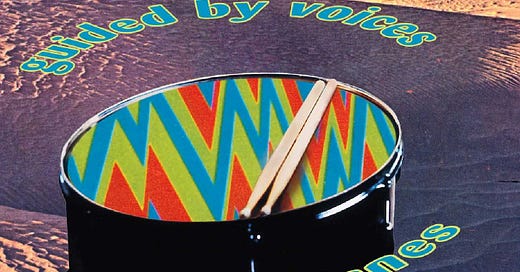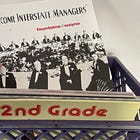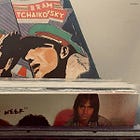It’s easy to forget that Alien Lanes was already Guided By Voices’ eighth album upon release in 1995.
This 28-song collection was the prolific Dayton, Ohio collective’s highly-anticipated follow up to 1994’s Bee Thousand and their Matador Records debut. Much like it’s predecessor, Alien Lanes combines the short songs, lo-fi production, and world class pop hooks that have been frontman Robert Pollard’s calling card for 40+ years.
I was writing for my roommate’s fanzine in 1995 and already enthralled with Bee Thousand and 1993’s Vampire on Titus, but Alien Lanes hit different when a promo copy arrived in the mail. This album became an obsession from the moment I heard the somber call to arms of “A Salty Salute.”
We discovered GBV was playing The Troubadour later that month, snatching the last three tickets day of show. The seasoned bar band vibe combined with Pollard’s beer-soaked, high-kicking swagger turned me into a lifelong fan. The club was packed that night, but it still felt like we were in on an important secret.
Alien Lanes has been my go-to GBV album ever since.
I’ve returned to it repeatedly through the twists and turns of my adult life, seeking solace in its familiar grooves while endlessly in awe of its unquestionable genius. My tastes are too fickle for me to make a definitive favorite albums list, but Alien Lanes always seem to be near the top in any given moment.
Certain tracks also feature prominently on the soundtrack of my life. “Motor Away” became the theme song for the long-distance relationship I had with my future wife. And my youngest kid and I listened to “As We Go Up, We Go Down” and “Closer You Are” on repeat while playing endless card games on our living room floor.
In celebration of its 30th birthday, I’m going song-by-song on Alien Lanes.
What’s Your Favorite Guided By Voices Album?
1. "A Salty Salute"
I initially experienced this song as a rallying cry for all the salt-of-the-earth underground denizens left behind by the mainstreaming of alt rock. Over time, I came to think of it as more of a spiritual successor to Neil Young’s dark masterpiece, Tonight’s The Night, with deeper themes of disillusionment. It really sets the mood for the album. Best opening track ever? It’s definitely up there, in my book.
2. "Evil Speakers"
With the level-setting introductions to a broader audience out of the way, Pollard and his band of beer-guzzling Midwesterners get straight down to business. Looking for a single track to sum up the countless idiosyncratic thrills on offer here? This :58-second blast of indie pop bliss would be a great choice.
3. "Watch Me Jumpstart"
The guitar riff is worthy of Ween at their sludgiest. Only a pop songwriting genius like Pollard could manage to pull this track from those subterranean depths with a vocal line that positively soars in moments, all delivered in a slight British accent and with plenty of ruffly-shirted ‘60s pomp.
4. "They're Not Witches"
It’s easy to dismiss this song as a stylistic digression, but repeated listens prove that it’s integral to the album’s overall sonic texture. GBV’s penchant for esoteric lyrics is well-known, but the use of the word “witches” displays a deep understanding of rock and roll tropes and the willingness to toy with powerful imagery.
5. "As We Go Up, We Go Down"
Five songs in and we finally get the kind of British Invasion pop track that is at the core of Pollard’s genius. It prints as a “watch what you wish for” love song, but the cryptic lyrics suggest he’s singing about GBV’s success and the anxiety-inducing expectations that come with leaving the comforts of his garage for the spotlight:
I speak in monotone: "Leave my fucking life alone"
As we go up we go down
As we go up we go down (And see the truth yeah)
As we go up we go down (Is just a lie)
6. "(I Wanna Be a) Dumbcharger"
A perfect ‘90s indie rock reset after the heart-on-his-sleeve nature of the previous track. If the album was sequenced to go directly from “As We Go Up, We Go Down” into “Game of Pricks,” GBV would be leaning too obviously in a pop direction. Those thrills must be earned in Pollard’s carefully curated world.
7. "Game of Pricks"
Some power pop purists love to debate whether or not GBV fits the genre. I’d say they probably aren’t a power pop band in the strictest sense (very few bands are when you go song by song), but this is a prime example of how the genre evolved in the ‘90s. This could almost be a mid-‘60s Beatles demo. What’s more power pop than that?
8. "The Ugly Vision"
The sugar high from “Game of Pricks” is followed by an emotional crash. This seems to be a lament about the spot that Pollard found himself in as 37-year-old overnight indie rock sensation. Side note: I’ve long thought this track would have fit perfectly on Camper van Beethoven’s Beloved Revolutionary Sweetheart.
9. "A Good Flying Bird"
A thematic continuation of the previous track, but with more of a pop bent as penned by guitarist Tobin Sprout. Instead of wallowing in their own doubts, the band seems to directly address their early fans here:
Many years we spent unpressured
That we knew so swell
Love in times of simple pleasures
Only time would tell
Oh, this is not to say
We are not the way we used to be
10. "Cigarette Tricks"
A strangely evocative :18-second interlude. Gold star for all the rock and roll imagery crammed into only two lines of the verse. (Note: If you type “cigarette tricks” in the YouTube search bar without “GBV,” you’re heading down a rabbit hole.)
11. "Pimple Zoo"
This album is a prime example of ‘90s DIY garage/basement recording, but there is very little about it that feels like straight up garage rock—outside of this song. The plodding, crunchy guitars provide a fuzzy backdrop for the confrontational lyrics.
12. "Big Chief Chinese Restaurant"
Rockethead? Napoleon? I have no idea what this song’s about, but I love that it ends with the unreliable (and quite possibly unhinged) narrator threatening to visit “Big Chief’s place” and “slap his factory down.”
13. "Closer You Are"
I’ve long thought this song was a nod to first wave British punk. Shut your eyes and imagine Buzzcocks tearing into it. See what I mean?
14. "Auditorium"
Listening sequentially, this always felt like more of a prelude to “Motor Away” than a standalone track. The fact that the two songs were bundled together for the official video (see intro above) makes me think I was onto something.
15. "Motor Away"
My relationship with this track is so deeply personal that it’s almost impossible to write about it objectively. Not only is it important to our marriage/family origin story, but it also delivered an ecstatic (almost out of body) experience when my mid-‘90s surf punk band covered it at a backyard party for a sun-drunk hometown crowd late in the day on Fourth of July.
So, I’ll rely instead on Steve Hyden’s insightful 2016 review for Pitchfork (9.2 rating!):
In ‘Motor Away,’ which lives at the heart of Alien Lanes both sequentially (it’s the 15th track) and spiritually, Pollard sings about the liberation of blasting down an open road in order to ‘belittle every little voice’ in your crummy town that ever doubted your ability to escape, while also acknowledging that those people might be right. ‘You can’t lie to yourself that it’s the chance of a lifetime,’ he sings, which is all the more remarkable for the surging, life-affirming music that surrounds it.”
16. "Hit"
:30 seconds of self-effacing exasperation never sounded so pop.
17. "My Valuable Hunting Knife"
I previously mentioned the ongoing GBV vs. power pop debate. So, while co-editing Go All The Way: A Literary Appreciation of Power Pop, I asked my pal, bandmate, and GBV obsessive Dylan Champion to tackle the subject. In the essay, he spotlights “My Valuable Hunting Knife” as a “jabbingly power pop opus” that points a lo-fi pinhole camera “into the musical heart of power pop.”
“(Pollard’s) earnest belief in rock’s supreme power, the unabashed love for the stuff, the show, the high-kicking without irony—actually somewhat ironically—brings Pollard even more into harmony with power pop because, unlike the larger indie scene where it’s housed, power pop ain’t about irony. It’s about genuine reverence—pure, formative love for a music that channels the chaotic, aching energy of, heretofore at least, adolescent boys. As has been said, it’s music made by record collecting obsessives—okay, nerds—who, having worn out all the records that sounded good, had to make more themselves.”
Or, in Pollard’s own “Valuable” words: “It will not rust through the tears, and it will not lose its appeal over years. Come on!”
18. "Gold Hick"
Lest their be any doubt about Pollard’s conflicted feelings regarding his music career at this pivotal moment, he lays it all out for us:
All my dumb luck and all my misgivings
I thrust them aside for the dead, for the living
In other words, he’s pushing forward for all the music-lovers out there who, like him, need this kind of music to contextualize the world—even if it means going down in flames like the infamous Red Baron (aka “Baron von Richthofen”).
19. "King and Caroline"
A healthy dose of ‘60s psychedelia complete with plenty of lyrical weirdness (“Roll over like an egg,” etc.) which—like much of GBV’s writing—suggest an underlying message that’s as slippery as it is important. Easily one of the album’s loveliest songs.
20. "Striped White Jets"
A paranoid arena rock anthem that ratchets the tension up until it seems as if the guitar strings will snap. There’s a real sense of menace here (intensified by Pollard’s insistent shushing) that’s more akin to Pink Floyd’s The Wall than any of GBV’s mid-‘90s indie rock pals and peers.
21. "Ex-Supermodel"
While much of the album seems to deal with Pollard’s misgivings about his pending rock stardom after years of fantasizing about it, here we get a glimpse of what that dream might actually look like (note the sound of snoring throughout). Much like the disillusioned rock star Pink in the film adaptation of The Wall (see what I did there?), this vision of rock star excess aligns more closely with the self-indulgent ‘70s template than the more subdued indie rock ‘90s.
22. "Blimps Go 90"
The Beatles influence remains strong here, although this one moves closer to the Fab Four’s more fantastical post-LSD output than “I Want To Hold Your Hand.” The image of blimps is strangely nostalgic when paired with a happy pop tune, but the carnival ride swerves into darker skies as Pollard conjures “rifle games for seven-year-olds” and ‘‘sad freaks of the nation.” Maybe this blimp is the Hindenburg as piloted by Baron von Richthofen?
23. "Strawdogs"
I can’t decide if these lyrics are about soldiers, or if it’s a metaphor for the hordes of bandwagon-jumping alt rock fans that emerged in the ‘90s. “Strawdogs” were apparently ceremonial objects in ancient China (in lieu of ritual animal sacrifice) that were designed to be disposable:
We are the willing supporters
And we'd like to know
Why everything is so unkind
We really should be fine, yeah
24. "Chicken Blows"
This is Pollard doing his best Bearded Beatles. It’s sensational.
25. "Little Whirl"
“Little Whirl” might be the most perfect power pop song on Alien Lanes. That’s really saying something for an album that also includes “Game of Pricks” and “My Valuable Hunting Knife,” but it’s true. Hit the repeat button. Hit it again. Hit it!
26. "My Son Cool"
It’s pretty audacious to put a song this good 26 deep on an already incredible album. In a way, this track plays like a complement to “Evil Speakers” in that it encapsulates all of the sonic textures that came before it, harnessing the entire mood of Alien Lanes in a single track that clocks in at a tidy 1:41.
27. "Always Crush Me"
If there’s a stylistic outlier on this eclectic collection, this is it. The unholy love child of White Album Beatles and John Cale’s oppressive vision for The Velvet Underground, this one always leaves me feeling a little unsettled.
28. "Alright"
Alien Lanes closes out with an uncharacteristic “extended jam” that would feel more at home on an early ‘90s Teenage Fanclub album. At 2:58, it is the longest song, but we don’t hear from Pollard until about the halfway point. Even then it’s more of a backing vocal than a lead, at least until the spoken word coda that includes this telling passage: “without songs, without hope, without meaning.” To me, those lines speak volumes about Pollard’s seemingly insatiable need to create, record and release the music through which he processed his uncertain future in 1995.
(Don’t worry, mid-‘90s Bob. It all turns out alright for you and the revolving cast of characters in Guided By Voices. Time proves that Alien Lanes is a masterpiece.)









Alien Lanes is one of my favorites GBV, but also for historical reasons I can't resist to "Under the Bushes ... ". Although I was a GBV obsessed since Bee Thousand, this was the first album I brought. I totally understand someone who prefers Alien Lanes. It's awesome algum, no doubt about it, but I just can't forget the experience of listening the first GBV completely
This was sublime. Thanks so much. Hard to pick a fave GBV album but at the end of the day, this is prolly it.